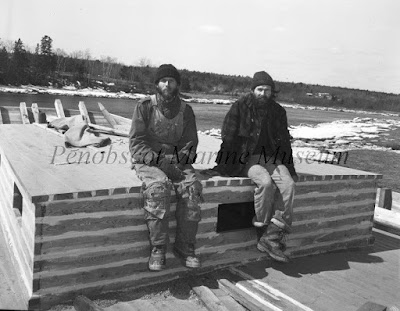Growing Up as Part of America's Back to the Land Movement, Part 2
Continued from Part 1 of Growing Up as Part of America's Back to the Land Movement in Maine
Like I said, my parents have surreal stories about trying to find work in rural Downeast Maine. My mom tried netting elvers, which fetched around .20 cents a pound or something (those little translucent baby eels have gone gangbusters in recent years). And she harvested Maine's famous, low-bush blueberries — a back-breaking task, as I would find out when I did it growing up; in fact, when I raked blueberries 20 years later, I was paid $2.30 for a 33-pound box of blueberries — the same as the crew leaders gave my mom. A single pint weighing 12 ounces at the grocer could run $3.
My dad did carpentry, repaired boats at the local sardine cannery before it closed, and dug for clams. But he's particularly remembered for building a 65-foot schooner called the Janet May in 1984. Steve Pagels hired my dad and Phil Shelton, and the two of them built the sailboat out of the barn on our property. To keep costs low, they'd chop down trees, drag them from the woods with teams of horses, plane them into boards, and then build the boat.
The launch was a nail-biter, with everyone questioning whether the schooner would squeeze through a narrow drawbridge near town (launched in the Narraguagus River, the boat had to pass through the drawbridge at the mouth of the river to reach the bay). When it made it through with just inches to spare, it was a success celebrated by the whole town, and the Janet May appeared on the welcome sign to Milbridge until around 2010. After sailing around New England, the coastal schooner, now christened Bailey Louise Todd, still takes travelers on tours off Bar Harbor.
Born in 1982 to these flower children, I had a pretty great early childhood. By the time I was two or three, my parents had added plumbing and electricity to our home, and I was raised vegetarian, which was okay, aside from eating many-years-old frozen gray peas and other terrible things in the dead of February (at least, we'd grown them ourselves). Vegetarianism didn't last forever, and I rebelled as a teenager by eating a little meat (cold peanut butter and jelly sandwiches were no match for warm, school-lunch pizza — the strange red disks on top be damned).
And despite the region's desolate landscape, the back-to-the-land community was strong, and I regularly had friends to hang out with, including Ted and Mary Claire's son, Mason, who lived right across the street, and my good friends, the Checkers, who lived just up the road. But there was much more, because of the semi-communal lifestyle: Sunday barn raisings, potlucks, and days at the lake (often surrounded by skinny dipping adults). Not to mention the gobs of the untamed wilderness for endless, DIY adventures by myself.
But things started to change in sixth grade, when my classmates and I began to face a stinging reality: the entrenched poverty of rural Maine…
[Look for the next segment on Ravenous Traveler soon]
Like I said, my parents have surreal stories about trying to find work in rural Downeast Maine. My mom tried netting elvers, which fetched around .20 cents a pound or something (those little translucent baby eels have gone gangbusters in recent years). And she harvested Maine's famous, low-bush blueberries — a back-breaking task, as I would find out when I did it growing up; in fact, when I raked blueberries 20 years later, I was paid $2.30 for a 33-pound box of blueberries — the same as the crew leaders gave my mom. A single pint weighing 12 ounces at the grocer could run $3.
My dad did carpentry, repaired boats at the local sardine cannery before it closed, and dug for clams. But he's particularly remembered for building a 65-foot schooner called the Janet May in 1984. Steve Pagels hired my dad and Phil Shelton, and the two of them built the sailboat out of the barn on our property. To keep costs low, they'd chop down trees, drag them from the woods with teams of horses, plane them into boards, and then build the boat.
The launch was a nail-biter, with everyone questioning whether the schooner would squeeze through a narrow drawbridge near town (launched in the Narraguagus River, the boat had to pass through the drawbridge at the mouth of the river to reach the bay). When it made it through with just inches to spare, it was a success celebrated by the whole town, and the Janet May appeared on the welcome sign to Milbridge until around 2010. After sailing around New England, the coastal schooner, now christened Bailey Louise Todd, still takes travelers on tours off Bar Harbor.
 |
| A photo from the Penobscot Marine Museum of Phil (left) and my dad sitting on the partially completed Janet May. Looks cold. |
Born in 1982 to these flower children, I had a pretty great early childhood. By the time I was two or three, my parents had added plumbing and electricity to our home, and I was raised vegetarian, which was okay, aside from eating many-years-old frozen gray peas and other terrible things in the dead of February (at least, we'd grown them ourselves). Vegetarianism didn't last forever, and I rebelled as a teenager by eating a little meat (cold peanut butter and jelly sandwiches were no match for warm, school-lunch pizza — the strange red disks on top be damned).
 |
| Mom and dad (and me) on the partially completed Janet May |
But things started to change in sixth grade, when my classmates and I began to face a stinging reality: the entrenched poverty of rural Maine…
[Look for the next segment on Ravenous Traveler soon]
 |
| The Janet May on a license plate |

Comments